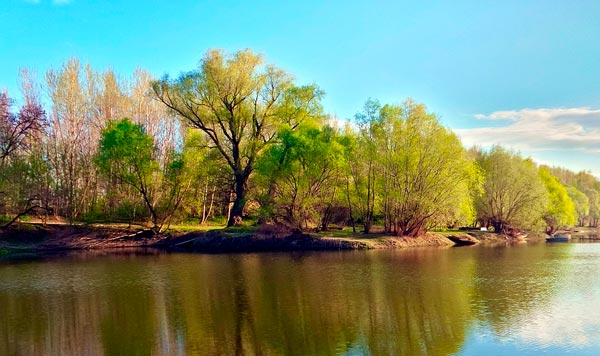Analysis of virsha Tyutchev spring water
The verse "Vesnyani Vody" was written in 1830, when Tyutchev was transferred to Nimechchin. Yak viyavilosya piznishe, the author mentioning those that spring in Europe is not particularly seen as a Russian. The main theme of the verse is the description of spring.
The plot of the layout in two parts. In the first part, it is described as a sleeping land. So, as far as early spring is concerned, the earth is not yet adapted to warmth, even the nights are cold. The middle of the head sign is the nastannya of spring, the author pidkresliv the poems of spring strumks. Another part of the news announced about the upcoming grass days. Tyutchev vvazhaє, which is the most common days of the day. Itself ochіkuvane warmly awaken natchnennya and new feeling, like in nature, so і lyrical hero. Fold in three stanzas. Tyutchev brought dynamism into the TV world, showing the uninterrupted flow of nature.
Tyutchev, for help, repeating showing the ruin of nature, and for the help, straight forward, moving the streams. Likewise, there is a philosophical pidtext, and even spring is time if it comes to life very much, there is a diva. The author, through the beast to nature, will show the human soul, the experience and the mandri.
Analysis of Virsha Tyutchev "Vesnyani Vody"
Fedir Ivanovich Tyutchev can be categorized as quiet poets, who especially subtly see their connections with nature, help to find snapshots in them and see all the prices in their views. Yogo vіrshі reminiscent of the noise of the wind, the sleeping birds, the rustle of the leaves, the vibrant overflows of dzherelny water, the curling of the khurtovins. Sings the booby nastіlki chuiny і sleepy, so without any problems, be-like changes in nature, represent with words, and show and analyze Tyutchev's verses.
It is a special place in the work of the author of the landscape painting, and it’s not wonderful, because you love the new light so much, as you love Tyutchev, you can’t be skinny. Let's give a butt to the poet's talent to convey in words divovizhnі landscapes є vіrsh "Vesnyani Vody". An analysis of Tyutchev's show shows how subtly the changes in nature since the beginning of spring are subtle.
Fedir Ivanovich said more than once that he should love winter even more, but Aletse did not tell him so little to describe the arrival of spring. Tvir buv writing for an hour of travel to Nimechchina, if I want to buv from the enemies of a foreign land, and not my own father, ale versh all the same transferring the enchanting spring mood, and it’s time for a rock in a very similar time.
An analysis of Virsha Tyutchev's "Vesnyani Vodi" shows, as accurately as it sings, conveys the atmosphere of early spring. At the same time, the picture is a birch tree, it’s not possible to get it, there’s even a snow on the fields, at night winter is fierce and empty, but it’s warmer in the daytime. Throughout the interchanges, you will be able to transform yourself into cheerful little lines, which will help you all about the coming of spring. An analysis of Virsha Tyutchev's showing, vikoristovuv sings in the distance, as a result of the aliteration, so that we can grow our tvir more lively and lively.
The author of the report about the coming spring, ale vin already well know the whimsical time of fate, so that I can tell you the analysis of Tyutchev's verse, so I will clarify that it’s just warm days to come only in the grass. At the first part of the theater, he sings a great number of vikorist acts, which mean the development, the quick development of the pod. The other part has more prikmetniks, which characterize the very time of rock.
An analysis of Virsha Tyutchev will show how the author, in his robotics, is able to identify inanimate objects and manifestations of nature with living things. So, spring was born with a young girl, and grassy days with cheerful and rummy children. The stagnation of metaphors allows you to carry out the association of springtime weather with human attitudes. It’s time to come clean and it’s time to come, for the winter splices, it’s not just nature, but hope for a new life, happy children, happy and sickly feeling.
At the same hour, the author, yak bi z side, sposterіgaє for the innovations of nature. Your youth has already irrevocably gone and you will be deprived of the need to support and miluvate the young awnings, as it will grow up to take on the winter and become an equal lord. Spring will re-create navkolishniy light, rob it beautifully and clean it. It's time to associate with youth, safety, purity and new lives. Chips of melted snow in gints, as they bring up not only about the arrival of warmth, but about the snaps that come into the souls of the skin people.
The main theme of virsha is to describe the early spring, if "there is still in the fields," when nature is awakened from winter sleep. Compositionally, it is stored in two parts. The first part of the verse is assigned to the description and has not thrown the ground ("sleepy shore"). At night, winter is so earthy, gentlemen on the earth, while it is warmer in the daytime, the earth is warmly warm, and the strings are awakening to the life of the provinces of spring. In the midst of a desolate sign of spring, Tyutchev vibrated one, the most characteristic of rice - spring streaks, like the dummies shouting, bringing up their radiant pictures all on their own way about the arrival of the warmth. Another part of the spring is dedicated to the cleaning of grassy days, and even spring comes in the "warm grassy days". Ochіkuvannya spring people natchnennya і remind і nature, і the hero of life.
The answer is to be related to the landscape lyricism, to be composed of three stanzas-chotirivirs, written by the chotiristop iambic in the cross-rims.
A show of dynamism: Tyutchev imagines the nature of nature yak without interruption. The transfer to the ruins is good to go for help, repeating words (spring, yede, bizhat, svidchit) and fussing over with words (to make noise, run out and wake up, run out and feud, svidchit). He sings vikoristyuє also repeat і direct language ("Spring is coming, spring is coming! // Mi young spring hіntsі, // Vona hung us forward!") For the spiritualization of spring struma, reflecting the natural phenomenon with the people. Tsі priyomi nadayut especially vіraznіst vіrsha.
Tyutchev's unprecedented artistry is especially poetic, and Tyutchev's chuinism is especially poetic in the field, as they created a beautiful image of spring. He sings a victorious, versatile palette of paths: epitheti (“rum'yaniy, light round dance”, “young spring”, “quiet, warm grass days”), metaphor (round dance of days, sleepy breg), detachment (“spring yde »), Repeat, allegory. Aliteration w, s additional help "feel" to run the streams of water, and aliteratsiya dzvinkih sounds b, bl, gl pіdcreslyє strіmkіst of this spring. The appearance of the springy changes in spring will also be passed on for additional growth of anthropology in the Chinese rows and the victorious three signs to the call in 12 rows of the verse.
Analysis of virsha Tyutchev F.I. "Vesnyani Vody"

The verse "Vesnyany Vody" can be brought to the landscape lyricism of Tyutchev. Vono bulo was written in 1830 rotsi. Whole creatures describe the miraculous period of early spring, awakening of nature from winter sleep, the coming of radish spring days
Reading virsh, efficiently vidchuvash the spring atmosphere. Seeing that in the morning it smelled like talim snig, near the moon when the birds were sleeping, the sun was getting cold in the winter, and we’d flood our souls with awakening and joy.
The change can be divided into two parts, primed according to the author's mood for the cob and in the end. At the first part of the earth, it’s becoming more sleepy - “it hasn’t thrown yet”, albeit for spring, water has sprung up, like to wake up and say: “Spring is coming”! The author is small two planes - earth and water.
At the first part of the chuєmo there is the noise of the water, the shimmering roach, like the wiklikє burhlivu joy. Repetition of an inaudible sound (b) (alitherats_ya) і hissing (w), in words to make noise, additionally helps to transmit the cobbled water. F. Tyutchev vikoristovuє bogato dієslіv (to make noise, bizhat, svіdchat). These words allow you to feel the rhythm of the creation and see the flow and the noise of the spring water, the coming spring. In the first statement, the author has put three specks. Singingly, he sings as much as he wants to say something about spring water.
Another part of virsha is the price of cleaning grass days.
Spring artist nadaє rice molo dіvchini. Travnevі days іsoblyuyuyutsya with little children, as they lead round dances and they have rumanі cheeks.
In the spring of F. Tyutchev, winter and spring are isolated. "Winter is not for nothing to be angry", Winter is "a see of evil", to be angry, angry, bother, grumble about Spring, throw in her dreams. Spring is "a beautiful child", in a knock, to a wife Winter in the yard and in my eyes. In the midst of the feast of rock, it has been comprehended, according to folk-poetry, as the struggle of two warriors.
"Vesnyany Vody", analysis of Virsha Tyutchev
F. Tyutchev wrote the verse "Vesnyany Vodi" in 1830, it’s about time he moved to Nimechchin. Itself sings, meaning that spring in Europe may not be seen as Russian.
the main theme virshi є describe the early spring, if "there is still in the fields," when nature is awakened from winter sleep. compositionally virsh is stored in two parts. The first part of the verse is assigned to the description and has not penetrated the ground ( "Sonny Breg"). At night, winter is so earthy, gentlemen on the earth, while the earth is warmer in the daytime, the earth is warm, awakening to the life of the provinces of spring - streaks. In the midst of a desolate sign of spring, Tyutchev vibrated one, the most characteristic of rice - spring streaks, like the dummies shouting, bringing up their radiant pictures all on their own way about the arrival of the warmth. Another part of the spring is dedicated to the cleaning of grassy days, and even the spring comes to "Warm grassy days"... Ochіkuvannya spring people natchnennya і remind і nature, і the hero of life.
Вірш, Шо to be reported to landscape lyrics... be stored in three stanzas iambic s crossover rimuvanyam.
A show of dynamism: Tyutchev imagines the nature of nature yak without interruption. The transfer to the ruk is good to go for additional help in repeating words ( spring, go, go, go) І lamentations with words ( make noise, run and wake up, run and feud, turn). Sings vikoristu also repeat і direct MOV ( “Spring is coming, spring is coming! // Mi young spring hіntsі, // Vona hung us forward! ") For the spiritualization of spring strumms, ottozhnyuchi natural phenomena with people. Tsі priyomi nadayut especially vіraznіst vіrsha.
Tyutchev's unprecedented artistry is especially poetic, and Tyutchev's chuinism is especially poetic in the field, as they created a beautiful image of spring. Sings Vikoristovu rіznomanіtnu palette of paths... institutes ( "Rum'yaniy, light round dance". "Young Spring". "Quiet, warm grassy days"), Metaphor ( round dance dniv, sonny breg), Isolation ( "spring is now". "Stink to svidchat"), Repeat, narration. Aliteration w, s additional help "feel" to run the streams of water, and aliteratsiya dzvinkih sounds b, bl, gl pіdcreslyє strіmkіst of this spring. The appearance of the spring's early changes is also passed on to the additional growth of anthropology in the Chinese rows and three signs to the call in 12 rows of the verse.
Tvir maє and philosophical pidtext: in the souls of skin people it is time for spring, if in the heart they come to life like spring winter hope, to bring joy of renewal and cleanse to happiness. Tyutchev, through the beast to nature, opened up in his own life the light of the human soul, the spirit and the experience.
The genre of the whole lyrical creation is simple virsh. The theme of virsha is spring, ї ї ї ї ї ї ї ї і ї ї ї ї ї ї ї ї ї ї ї ї ї ї ї ї ї ї ї ї ї vrachіkuvіvіy pohіd pіslja suvoroi zimi. The author will describe how spring leads you to be able to better inform all living light about the coming of the spring red-hot spring, I want to share the joy and all of them.
Virs are permeated with badior, sleepy moods. Tyutchev literally "infects" us with the happy ochikuvannya awakening of nature. The enmity will arise, as we are ready to march, like water, little rivers, little hints and rainbows of all spring sounds.
A set of motivations is simple, it’s easy to stock up on three chotirivirs, because it’s impossible to distribute for a snake, the stink of a single, uninterrupted story about "springtime".
Virsh to sound beautifully and harmoniously. The rhythm is clear, shvidky, badoriy, vin dopomagaє to convey to the "friendship" the mood of the "spring waters", which is smoothly converting into unison.
Sings, I will bring up the topic and the mood of the virsh, the victorious rizni priyomi. For example, adolescents: "young spring", "quiet, warm days", "rum'yaniy, light round dance." There is also a detachment here: drive to wake up, wake up, svіdchat, spring yde, there hung gіntsіv. Even at the top, they start repeating: "To wake up and wake up the sleepy coast, To shine, and shine ...", "Spring is coming, spring is coming ...". All the steps are taken to help the author to convey his thoughts even more accurately.
The main idea is the readiness of all living nature to check out the impatience of spring, unimportant to all the future of the world, and to make you think that people are also guilty of checking the garnets in their lives, unimportant.
Virsch winked at me with a lot of positive emotions, those nibi for good reason in the whole pre-spring light and chekash warm, "rum'ian" days.
Listen to the verse of Tyutchev Vesnyany Vody
The same creatures
Picture up to you anal_z virsha Vesnyan_ vodi

Picture abo little ones Vesnyany Vody

